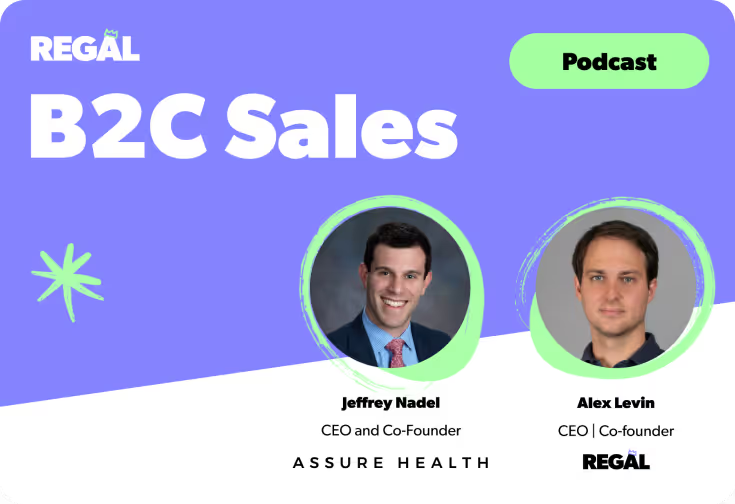
September 2023 Releases
AI Agents can handle thousands of conversations a day.
Inside each of those conversations, there are dozens of signals that impact the outcome of each individual interaction, and ultimately, the overall performance of your sales and support outreach.
As AI conversations grow in richness and volume, however, it’s become harder to gather these signals at scale in a uniform, automated way.
The challenge isn’t just how you collect data, either. It’s about collecting the right data.
It’s easy to flag keywords in a transcript, but that doesn’t tell you whether a customer was frustrated, or if they were actually interested. Surface-level tagging can’t capture nuance, but LLMs can.
With Regal’s Custom AI Analysis, you can define exactly what data to extract from your AI interactions, doing so automatically, even at enterprise-level call volumes.
Custom AI Analysis uses a large language model (LLM) to analyze post-call transcripts and extract the data points you define as most important for reporting and actioning.
You can:
Customized, automated post-call analysis helps unlock the business intelligence buried in every conversation, including (but not limited to):
.png)
Define the Call Signals that Drive Revenue
Custom AI Analysis lets you define data points (i.e. structured outputs) that capture what happened in the conversation, not explicitly how the agent performed.
For example:
While you can do some light QA with custom analysis (i.e. tracking disclaimer usage and script accuracy), your AI Agent performance measurement should generally be left to scorecards.
1. Choose from multiple data formats (Boolean, text, number, single-select, or multi-select).
.png)
2. Either let the AI determine outputs from the conversation (via Text or Number data types), OR explicitly dictate the outputs you want to extract (via Single/Multi-State and Boolean data types).
For example:
.png)
Below, you can see this in practice. On the call, the AI Agent determines:
The agent also extracts:
.png)
Once defined, a data point isn’t tied to a single agent or workflow.
So, once you’ve created data points for common details like contact information and sentiment, you can apply them across any range of call types, whether it’s for a sales flow, support, or otherwise.
This ensures you’re measuring intent consistently in aggregate, no matter what agent or workflow the data is coming from (more on this later).
These custom data points integrate directly into Regal Customer Journeys.
They’re immediately actionable for personalizing follow-up outreach (again, carrying across as many agents or workflows as needed).
For example, on a prospecting call:
This turns every call into a self-optimizing feedback loop, meaning the data captured today improves tomorrow’s conversations automatically.
.png)
Regal includes the data points gathered with Custom AI Analysis directly in the call.analysis.available event, so you can pinpoint exactly what happened in a single conversation (intent, objections, competitor mentions, or sentiment) and quickly identify where it succeeded or broke down.
That event would look something like:
"call_analysis": {
"no_ai": false,
"qualification_decision": "qualified",
"did_mention_competitor": true,
"follow_up_required": true,
"budget_confirmed": true,
"compliance_acknowledged": false
These call-level insights are rolled up into aggregate reporting, so you get macro-level performance insights that reveal patterns across entire workflows.
You can:
Instead of guessing what your customers care about, you know, because every call transcript is being turned into structured data.
.png)
You know that calls with competitor mentions typically have lower conversion.
One thing you can do is track a “did_mention_CompetitorXYZ” data point.
When tracked across conversations, you find that calls where a competitor is mentioned have lower conversion rates.
Not only does this show how many times Competitor XYZ is mentioned, it points to a solution.
In that case, you could:
Because the signal is captured in structured form, you can also monitor whether these updates lead to improved outcomes over time.
Let’s say you’re a Medicare provider tracking plan_interest_type across thousands of enrollment calls. After a few weeks, you discover:
With that data, your team can confidently:
In both cases, Custom AI analysis enables you to turn conversation signals into structured insights that drive action.
Because Custom AI Analysis is completely configurable, it works across any call type and any industry.
From lead qualification, to inbound support, scheduling, and billing inquiries, the examples below show just how flexible it is.
.png)
> See a more detailed rundown of how to set this up in Regal.
For contact centers running thousands of calls daily, Custom AI Analysis turns unstructured conversation data into actionable intelligence, without requiring call review and manual logging of highlights.
Custom AI Analysis automatically extracts the signals that matter most, and unlocks the ability to feed them directly into future outreach workflows and performance reporting.
The result: Consistent, detailed insight into customer needs, automated personalization in follow-ups, and faster improvements to your scripts and workflows at scale.
Ready to see Regal in action?
Book a personalized demo.









